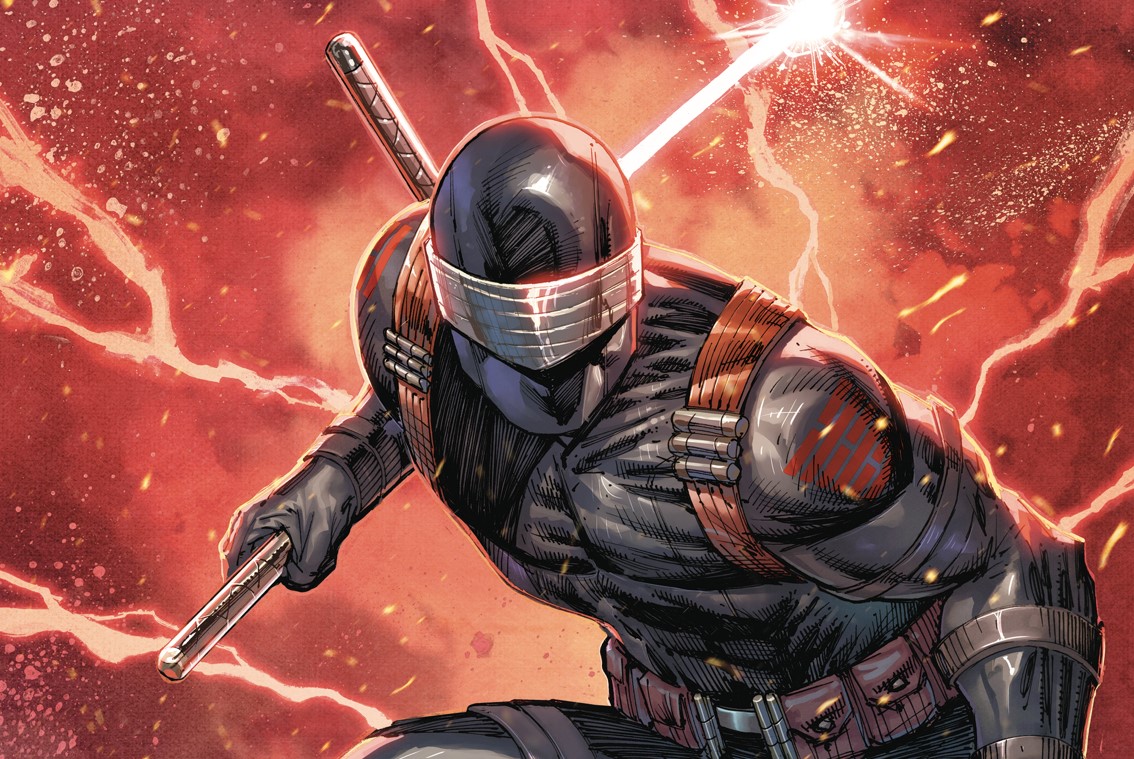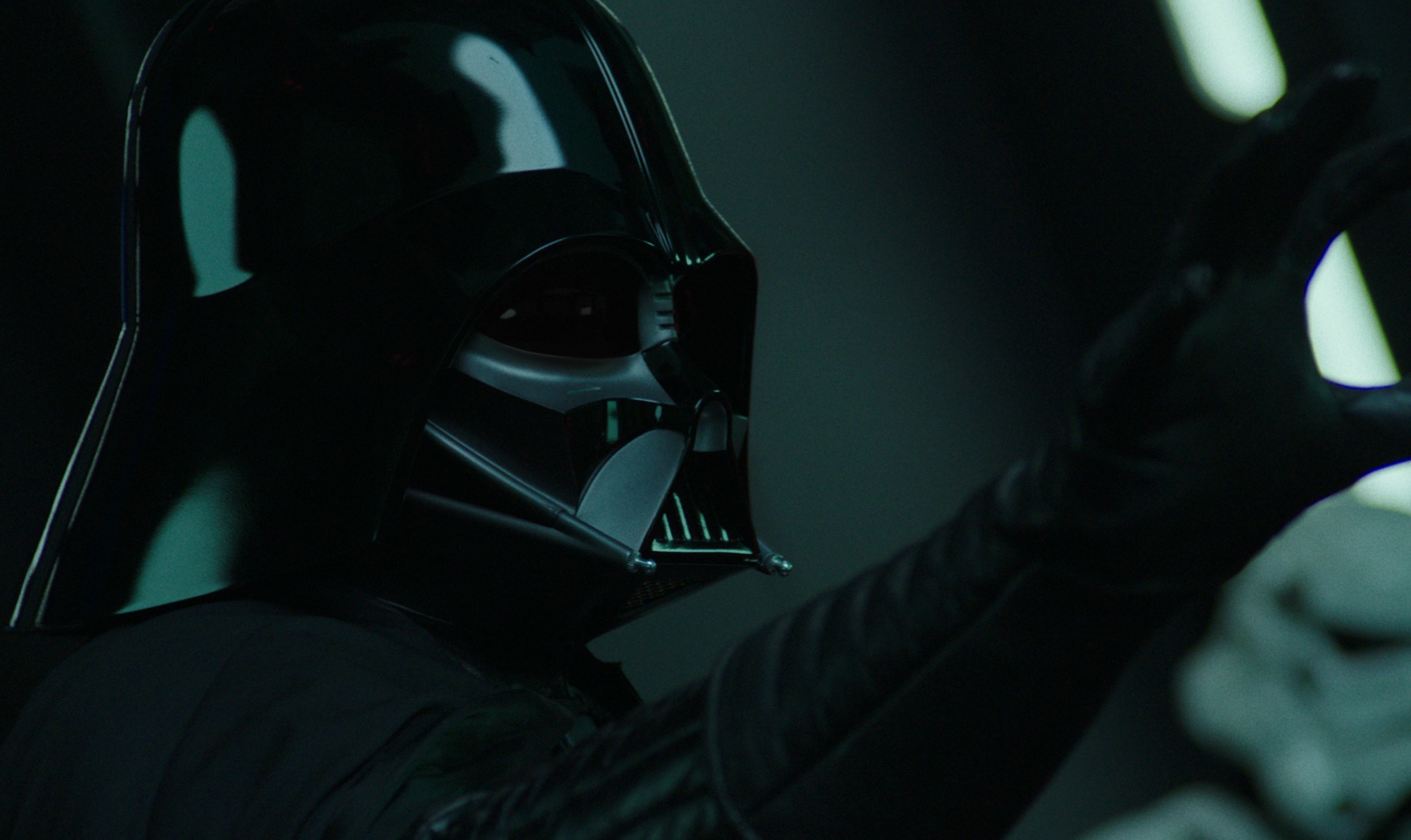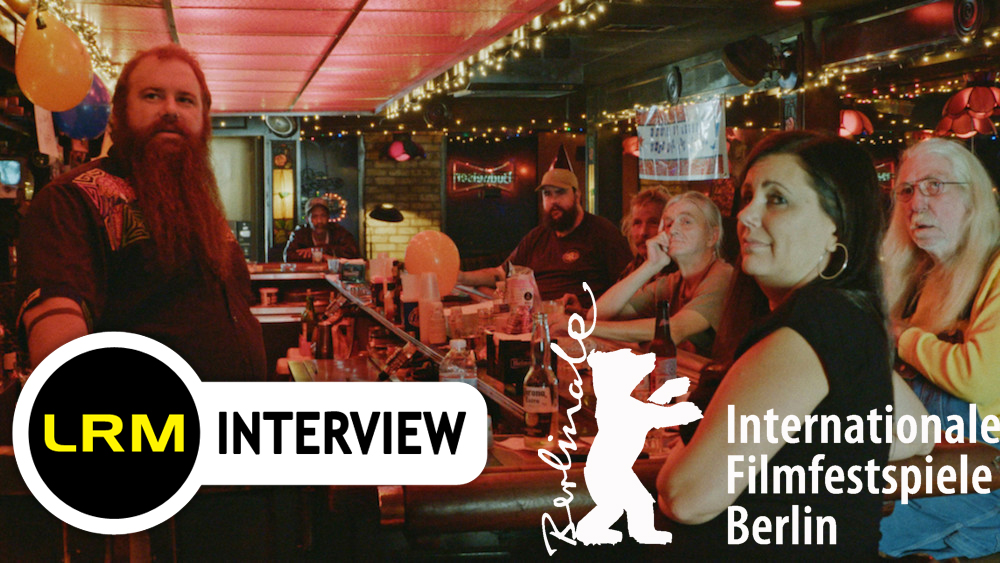
Bloody Nose, Empty Pockets is a docu-style drama filmed by the Ross brothers in a nostalgic Vegas bar appropriately named, Roaring ’20s, as its regulars genuinely drink their sorrows away one last time before their favorite watering hole is shut down for good. The film follows its mostly unglamorous, jaded patrons from morning into late night, as the diverse characters expectedly argue, cry, hug, complain and lecture one another. If you’ve never frequented one, this is precisely what one could expect of a typical night in a local American dive bar. Although it is at first a comforting, familiar and entertaining experience, it usually ends up in tears as the night progresses and the booze kicks in, at least for some.
Shot and directed by Bill and Turner Ross, the film recently premiered in the Panorama section of Berlinale, where we also had the chance to sit and chat with the creative duo. Check out what the siblings from New Orleans had to say about working together, casting the film with “real” characters, who played authentic versions of themselves, financing the film, how much of it was scripted, and what they hope to achieve. We’ll definitely be seeing much more from the Ross brothers in the future, but for now, take a shot and check out the film.
LRM: Can you talk about the casting of this film and if some of the bar regulars volunteered to be part of it?
Turner Ross: They were cast and brought together so that they were all complicit and we all went on this adventure together. It was really as an experiment, just creating a dynamic scenario and seeing where it will go.
LRM: Were some of the friendships genuine, like Pat and the guy with the long white hair?
Turner Ross: Yes, those two have been friends for a long time and when we were casting it, we knew that those two had to be in the film. We’d find somebody and we’d say, “Alright, we want you in the movie. But who’s your drinking buddy? We need some familiarity here.”
Bill Ross: We wanted the small alliances and then see if they would forge larger alliances, which they did, shockingly. Pam and Lowell have gone through good times and gone through tragedy together, and there’s a lot of depth there behind their good times.
LRM: Did you finance all the drinking in the film?
Bill & Turner Ross: Oh yeah, we did. Yeah.
LRM: Did all your money go into booze?
Turner Ross: I mean, it usually does anyway. But no, we didn’t. Fortunately, on the back end, we’ve had some people come on and be able to help us through that. But nobody really wanted to help us with this idea. It really was our friends coming together and saying, “we’ll get it done.”
LRM: What about the pot?
Turner Ross: We’re not here to condone that. I think these things are… Good question. Why?
LRM: Why didn’t anyone want to support you with the idea? I would think this film would resonate with many, as a typical local watering hole, where people go to forge friendships and drink their troubles away.
Turner Ross: I think it’s just a little scary for people.
Bill Ross: The pitch is like…this very well could not work. You know?
Turner Ross: Also we’re not making commodities. These are not commercial juggernauts. These are art films and people don’t look at it as a commercial investment. Usually when people come on board with us for anything, it’s because they’re investing in an idea and the arts and a love for cinema or whatever it might be. And for this, there wasn’t an elevator pitch that would make sense to anybody. And that’s not really what I’m good at anyway. But it was like… we have this broad idea, we would like to gather people together and sort of make The Iceman Cometh with real people and no script, and just see what happens.
LRM: It could pass for a docu-film.
Turner Ross: Yeah, in the sense that we’re mining natural resources. These are real people who are giving it of themselves what they want. And for us, realism is more important. Seeking a greater truth rather than some sort of… We’re not journalists.
LRM: How long do you think it takes you to shoot the film?
Bill Ross: The majority of it is an 18-hour nonstop.
Turner Ross: We knew we needed an inherent linear aspect to it. So the whole thing was put together in the course of a couple of months, but the primary armature of the film is based on an 18-hour, two camera, nonstop, unbroken happening where people are responding to each other and going further into the night.
LRM: How was the film received in Sundance, where it first premiered?
Turner Ross: So far, so good. We keep having audiences coming to the film and wanting to engage with us and hello, people of the press, you’re here talking to us. It’s all been positive.
I think it’s interesting because there’s a bit of wrestling with, well, how do we categorize this? And, there are some hangups there. But, the real fascinating part… and it’s wonderful to be in an intellectual space and talk to people about cinema and all of that, but when a grandmother walks out of a screening and says, “I may not look like it, but I’m one of those people.” Or somebody comes up and says, “My God, that reminds me of this thing!” Or “that guy is my father.” The people having a response to it… and young people coming up to us and talking about it. People who probably have not done a lot of time in bars like that. What are they seeing? I don’t know.
LRM: When you said on set out on this mission, what did you want to achieve with it? What were your goals in creating this film? And are you guys from Vegas?
Turner Ross: We live in New Orleans.
Bill Ross: Happy Mardi Gras.
Turner Ross: We certainly have some long running artistic intentions and thoughts about how we make these things. But really… finally it ended up just kind of being a moment of catharsis for us and collectively. When the fall of 2016 when people didn’t seem like they were speaking to each other and it seemed like there were a whole lot of voices that weren’t being heard. We knew that we had this thing that was just sort of burning a hole in our souls that we couldn’t get done. And it seemed like the right moment to do it. An experiment where people were pretty raw anyway, so why not? Why not? Let’s go for it and make a film in the shadows of the bright lights and see what people want to talk about.
LRM: The ending is symbolic and so is the character of Michael. Was he a metaphor for you in this film?
Turner Ross: Yeah, Michael is our guiding light. He was the one that we could talk to about some of these themes. The idea that this place was… The evolution of that character fascinates me because it’s happening in real time. It’s an actor responding to his situation. It’s also a human responding to a situation and watching that conflict going on in his mind and watching through the course of the night where somebody who was calling this place home and sleeping on a couch then, all of a sudden, looks around him and it’s sort of like a psychedelic moment. He sees maybe this isn’t what it is. And, he leans over to the guy next to him and he says, “I’m not your family, I’m just the guy that you drink with at a bar.” And he just walks out cold at the end of the film. Yeah.
LRM: Did that happen naturally or was it scripted?
Bill Ross: It’s natural in the sense that’s what occurred within our dynamic experiment.
And, those feelings…it’s complicated because feelings are at once real and also prescribed by someone who was considering the themes along with us.
LRM: Which parts were scripted by you?
Turner Ross: No snow boards on page. So it’s really just creating a scenario in which we’re introducing stimuli, bringing people in at certain points in the… all the participants, the cast as it were, were unaware of most of those things. They just knew that they were to bring whatever they wanted and be themselves and that they were going to respond to the world around them. So, Bill and I did all of that and thought that through in advance and knew sort of what things would be happening in certain times of day and who might enter now and how this might go. And then maybe go… let’s see what happens. But we didn’t put any words in their mouth.
LRM: Can you talk a bit about the cinematography, the opening credits, which are very retro and very ‘70s.
Bill Ross: That particular [opening] shot is speaking to our references, saying that out loud at the beginning [of the film]… you say that with the font and the look of the whole thing.
Turner Ross: A lot of the films that we were referencing ripping off were from that time. The ’60s, ’70s, that have some grit and wisdom to them. So it’s to pay homage to our fore-bearers. These are the films we’re watching, so let’s be aware of where we’re coming from and where we’re going. It’s also thematically built into the film. You’re in the Roaring ’20s and here we are in the ’20s again. It’s ideas of nostalgia and this time, also, will be a nostalgic time for someone in the future. So I’m trying to keep that loop.
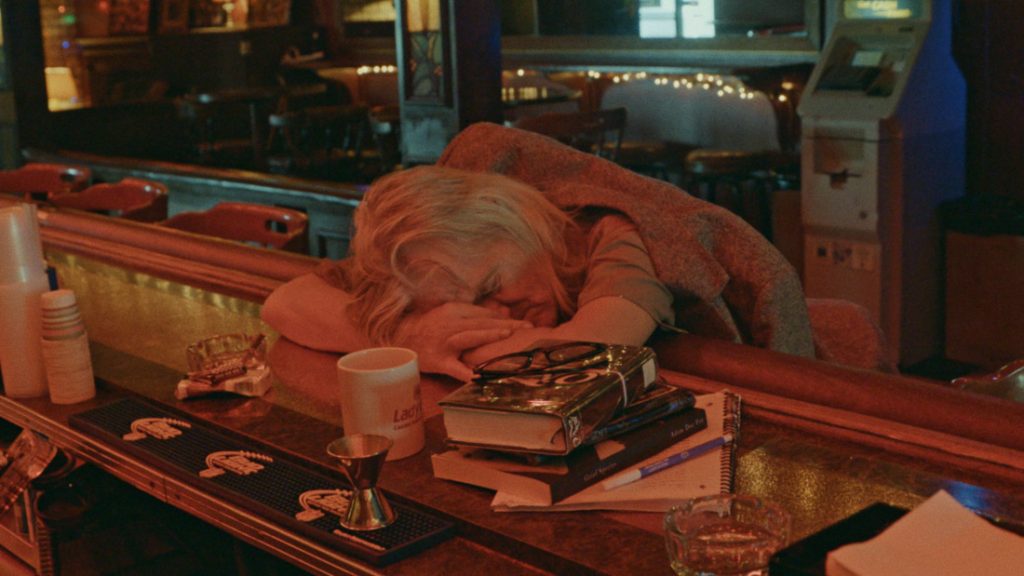
LRM: So are these guys now going to the bar and drinking together?
Turner Ross: They do, yes! One of the greatest stories out of it is Lowell with the long white hair and the Australian man, John, met on set, had real weird experience, and then later decided they wanted to keep being friends. So Lowell flew to Australia and John picked him up at the airport. But John lives 500 miles away from the airport. So they went on this wild two-week road trip together across Australia. It’s a lot of different stories and they all have their own lives. And this was an intentional community for a moment in time. But so are all these places. For the sake of the film, that’s true. But also these chosen spaces are many intentional communities that don’t last forever.
LRM: The topic of politics comes up at a little portion of it. I was actually surprised that it wasn’t a bigger discussion because during the time you were filming, a lot of people were very divided and passionate about what was going on. They still are, but you know.
Bill Ross : To the benefit of the film, people were feeling emotional one way or the other. So I feel like their emotions were a little closer to the skin as a result of that. It was the actual day right after the election, so people were talking about it. But through editing, we knocked that back quite a bit because I wanted the film to feel more timeless. People talk about that stuff enough.
Turner Ross: We’re still talking about it. And it’s just ad nauseam. It’s not helpful. So what are we talking about when we’re not talking about that? Or what are we really talking about when we’re having these political arguments with each other? We wanted to avoid any sort of overt politicization, but I mean, obviously everything is politics in the end. We just wanted to get closer to the human being and saying maybe we should just sit in the bar and talk to each other.
There are varying opinions in that space. People are arguing over their generations and the impact they’ve had on the world or the lack of impact they’ve had on the world. So maybe getting closer to what we’re actually talking about when we say, “red” or “blue” or “Trump” or “Hillary” or whatever.
LRM: Well, well done on that. I wouldn’t have wanted to see it become a political piece.
Bill Ross: No, that would’ve been a nightmare.
LRM: I loved seeing the different stages of alcoholism. It all ends up in tears at some point.
Turner Ross: It’s a lubricant for grief. Helps to grease the wheels a little bit.
Also See: Berlinale Exclusive Interview With Death Of Nintendo Writer Valerie Castillo Martinez
LRM: That’s a good one! Is there anything that you want to talk about, rather the same old questions asked by the journalists?
Turner Ross: Well, we can give whatever answer we want. So we can talk about what we want to talk about. I feel, generally, we’ve been able to get to a good place of what we would like to talk about. But you can always go further. It just depends who you’re talking to as well. You know, what outlet is it or where or who is this person?
Bill Ross: Somebody asked us, at Sundance, they said… this is the wildest question we got during Q&A, and the guy said, “what would you have done if the place burned down?”
Turner Ross: That was a good question.
Bill Ross: And we were like…. what?
LRM: Leave. Run.
Turner Ross: We didn’t have a contingency plan! Yeah, seriously! I think he was worried… he was concerned, he was worried, I guess. We had said that we had locked the doors, or maybe that it was a closed set, or… we used some sort of wording that I think he thought we were all just locked in the bar.
LRM: Who worked most on the cinematography?
Turner Ross: We both did.
LRM: Why did you choose that particular bar to film in?
Turner Ross: Well, obviously in this situation, the bar is as much a character as the people. The landscape of their faces is really important, as is the landscape of the bar. And for us, through long, long scouting sessions, we arrived at sort of a quintessential idea of what we wanted and for us The 20s bar represented that…and has a good look.
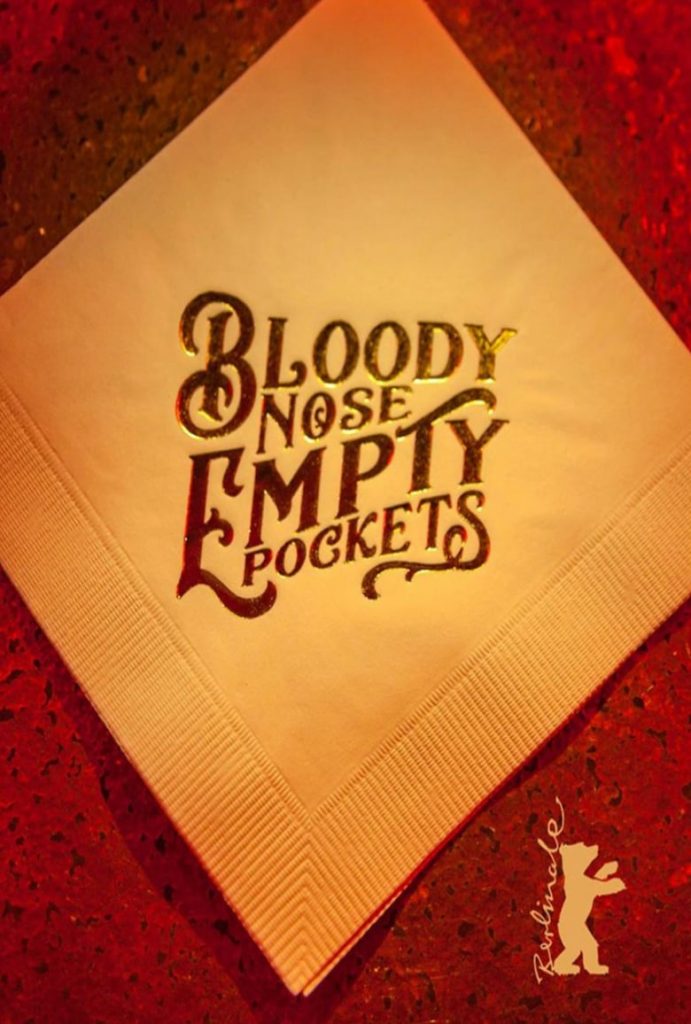
LRM: Did you have any emotional moments during the shooting?
Bill Ross: Yes. It was a very intense, long, emotional day. I mean the worst… I set my camera down real quick to just stretch because carrying the camera for that long is horrible. I set it down on a table like this and the bartender knocked the table and the camera fell to the floor, the lens pops off and it’s broken. And so I’m like, Oh, I fucked the movie. The movie’s done. But, we still had Turner’s camera and we quickly got somebody to run another lens out. So we only had the one camera down for like an hour.
Turner Ross: For a moment there… boy, was I mad.
Bill Ross: Yeah, but then it got pretty heated.
Turner Ross: But then, you came back and you got your best shot. You came to play.
Bill Ross: So the first shot I got when we got the other camera back was the two guys on the couch, laying on top of each other and talking.
Turner Ross: Bruce kills me, the old veteran. You got to understand that he knows that this is just a scenario. He knows that we’re just going to do this tonight, man. But for that moment… it was home to him. He really believed that. And he really cried when he left. Even that simple sense of community, just one safe space for a minute was just deeply meaningful to him. And he still calls me every week. That’s real emotion, and that somebody wanted to share that with me… it’s a lot.
LRM: It’s better than a group home, going to a bar and feeling a sense of community and sharing your story with others.
Turner Ross: Well, like Bruce says, it’s a place where you can go when nobody else wants you. He said, “I fit in here.” Yeah, man, a chosen community for a night.
LRM: What do you hope to achieve through this whole process? What do you hope people will take away from this experience?
Turner Ross: I hope that people do have takeaways. I hope that people have conversations, I hope that people want to continue talking with us. For me, our achievement is making the film, and that’s the conversation that we wanted to have with each other. If that becomes a film like the films that we love where you walk out and you’re not done with it, that’s wonderful. But there’s no one thing that I want everybody to… I just hope that we can all spend some time together and talk.
LRM: Are you guys planning on continuing filming together?
Bill Ross: Oh yeah.
Turner Ross: Oh yeah. We’ve been doing this together for a while.
Bill Ross: All our lives.
Turner Ross: Hope that people keep supporting us.
LRM: What is it like filming together as brothers? Do you fight a lot?
Turner Ross: No, we used to-
Bill Ross: We used to. Early on, yes. So this is our fifth feature…but it’s not fist fights anymore
Turner Ross: It’s just a good conversation. We’ve been making things together since we were little kids and we have a shorthand, You couldn’t hire somebody to work like that. We have shared interests and a shared goal and we’re able to go to deep places with each other. Then we’re also able to get fuck out of each other’s company for a while.
LRM Online contributor and active Army soldier Kyle Malone needs your help. CLICK HERE to lend a hand to the cause!
—–
Have you checked out LRM Online’s official podcast feed yet The LRM Online Podcast Network? This includes our flagship podcast Los Fanboys, our premiere podcast Breaking Geek Radio: The Podcast, GeekScholars Movie News, and our morning show LRMornings. Check it out by listening below. It’s also available on all your favorite podcast apps!
Subscribe on: Apple Podcasts | Spotify | SoundCloud | Stitcher | Google Play

 FOR FANBOYS, BY FANBOYS
Have you checked out LRM Online’s official podcasts and videos on The Genreverse Podcast Network? Available on YouTube and all your favorite podcast apps, This multimedia empire includes The Daily CoG, Breaking Geek Radio: The Podcast, GeekScholars Movie News, Anime-Versal Review Podcast, and our Star Wars dedicated podcast The Cantina. Check it out by listening on all your favorite podcast apps, or watching on YouTube!
Subscribe on: Apple Podcasts | Spotify | SoundCloud | Stitcher | Google Play
FOR FANBOYS, BY FANBOYS
Have you checked out LRM Online’s official podcasts and videos on The Genreverse Podcast Network? Available on YouTube and all your favorite podcast apps, This multimedia empire includes The Daily CoG, Breaking Geek Radio: The Podcast, GeekScholars Movie News, Anime-Versal Review Podcast, and our Star Wars dedicated podcast The Cantina. Check it out by listening on all your favorite podcast apps, or watching on YouTube!
Subscribe on: Apple Podcasts | Spotify | SoundCloud | Stitcher | Google Play

